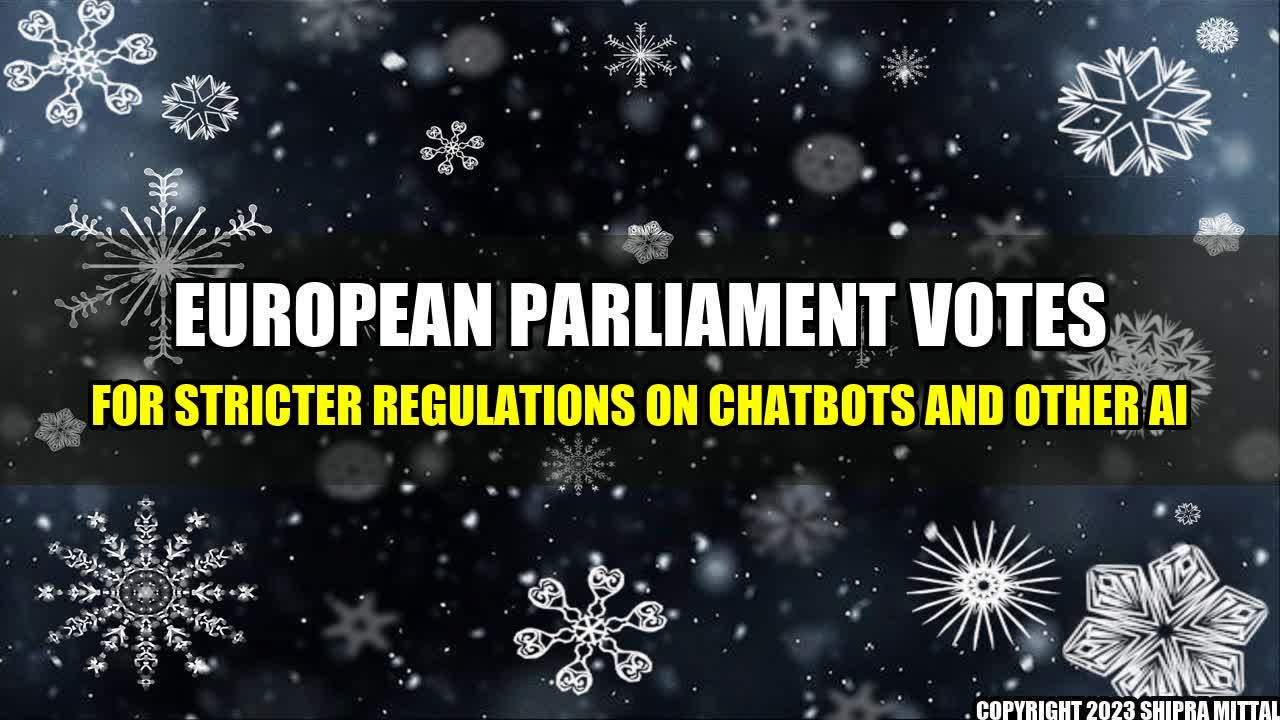It's a familiar story: You visit a website seeking help, and a friendly chatbot greets you, ready to answer any questions you may have. But what happens when the chatbot begins to act like a human, perhaps even getting too chatty, too pushy, or too friendly for your own good? This is the situation that many consumers find themselves in today, and it's one that the European Parliament hopes to address with new regulations.
What has the European Parliament voted for?
The European Parliament has voted in favor of stricter regulations on chatbots and other forms of artificial intelligence (AI) that interact with consumers. Among the measures that Parliament has proposed are:
- Mandatory transparency for chatbots and other AI systems that interact with consumers, including clear identification of the system as non-human.
- Requirements for chatbots and other AI systems to clearly disclose their purpose and limitations, as well as any biases or limitations in their programming that may impact the accuracy of their responses.
- Protections for consumers against overly aggressive or deceptive chatbots, including the ability to "opt-out" of automated communications and the requirement that chatbots not be programmed to "trick" or manipulate consumers into buying products or services.
- Greater resources and funding for regulatory agencies tasked with overseeing chatbots and other AI systems, including the ability to conduct regular audits and investigations to ensure that chatbots are complying with regulations.
The European Parliament passed these measures in response to concerns from consumers and consumer protection groups about the impact of chatbots and other AI systems on consumer privacy and autonomy. The measure has been praised by many as a significant step forward in protecting consumers from the unintended consequences of AI.
the Need for Regulation
While it's difficult to quantify the exact impact that chatbots and other forms of AI are having on consumers, some studies and individual experiences suggest that there is a need for greater regulation. For example:
- A 2018 report by Google found that 44% of consumers feel that chatbots should identify themselves as nonhuman and disclose their purpose upfront.
- In 2019, a study by the Better Business Bureau found that consumers are more likely to trust chatbots that are transparent about their limitations and abilities.
- Many consumers have reported feeling frustrated or misled by chatbots that are programmed to offer limited or scripted responses, or that fail to answer their questions accurately.
These examples suggest that there is a real need for regulation of chatbots and other AI systems that interact with consumers, both to protect consumers from deceptive or overly aggressive chatbots, and to ensure that consumers are able to maintain their privacy and autonomy when interacting with technology.
Why is this important?
The regulation of chatbots and other AI systems is important for several reasons:
- Consumer protection: Consumers have the right to access technology that is safe, transparent, and respectful of their privacy and autonomy. By regulating chatbots and other AI systems, governments can ensure that consumers are not taken advantage of by deceptive or overly aggressive chatbots.
- Innovation: By providing clear regulations and expectations around the use of chatbots and other AI systems, governments can help to foster innovation and competition in the tech industry. This may lead to the development of more advanced and useful chatbots, which can benefit both consumers and businesses.
- International cooperation: As the use of chatbots and other AI systems becomes increasingly widespread around the world, it's important for governments to work together to establish clear standards and guidelines for their regulation. The regulations proposed by the European Parliament may set an example for other countries and regions to follow.
Conclusion: The Future of Chatbot Regulation
The regulation of chatbots and other AI systems is an important and rapidly evolving issue. While the measures proposed by the European Parliament represent a significant step forward, it's likely that further regulation and oversight will be necessary as the use of chatbots continues to grow. For consumers, it's important to be aware of your rights and to stay informed about industry developments in the world of chatbots and AI. With greater transparency and regulation, chatbots and other AI systems have the potential to be powerful tools for both businesses and consumers.

Akash Mittal Tech Article
Share on Twitter Share on LinkedIn